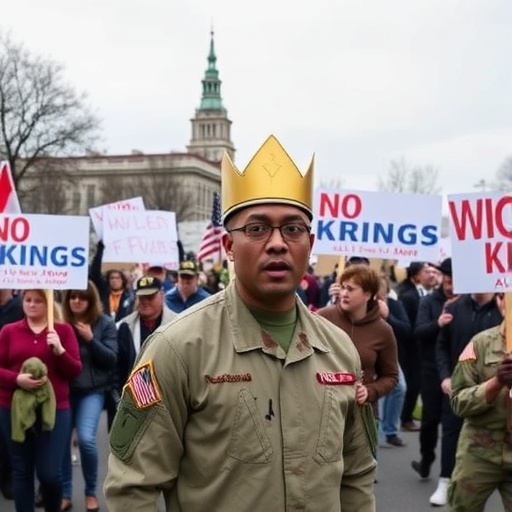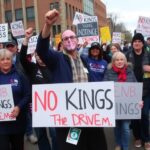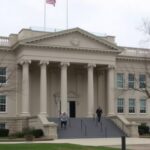Thousands Rally in ‘No Kings’ Protest Against Trump Administration Across Virginia, National Guard Mobilized
In a wave of fervent opposition, thousands of demonstrators flooded the streets of Richmond and other Virginia cities on Saturday, igniting the state’s largest political demonstrations in years as part of the nationwide ‘No Kings’ protest movement. The rallies, aimed squarely at the Trump administration‘s policies, saw peaceful crowds chanting slogans against perceived authoritarian overreach, drawing an estimated 15,000 participants in Richmond alone. As tensions rose, Virginia Governor Glenn Youngkin ordered the mobilization of the Virginia National Guard, a move that has ignited fierce debate over civil liberties and public safety.
- Richmond Rally Ignites with Passionate Speeches and Symbolic Acts
- Governor Youngkin’s National Guard Call-Out Fuels Controversy
- Nationwide ‘No Kings’ Wave Targets Core Trump Administration Policies
- Personal Stories from Protesters Highlight Stakes of the Movement
- Protests Signal Broader Shifts in Virginia’s Political Landscape
The Richmond rally, centered around the state capitol, began at noon with a sea of signs reading ‘No Kings in America’ and ‘Democracy Over Dictatorship.’ Organizers from grassroots groups like Virginians for Justice and the national No Kings Coalition reported overwhelming turnout, surpassing initial expectations by 50%. Protesters, spanning generations from college students to retirees, voiced grievances over immigration crackdowns, environmental rollbacks, and what they called erosions of democratic norms under President Trump’s leadership.
Richmond Rally Ignites with Passionate Speeches and Symbolic Acts
The heart of the No Kings protest pulsed in Richmond, where the historic capitol grounds transformed into a vibrant tapestry of activism. By mid-afternoon, the crowd had swelled to over 15,000, according to police estimates, with participants waving American flags alongside protest banners. Speakers took the stage one by one, delivering impassioned addresses that blended personal stories with broader critiques of the Trump administration.
Lead organizer Maria Gonzalez, a 42-year-old teacher from Fairfax, opened the event with a rallying cry: ‘We stand here today not as subjects, but as citizens demanding that no one king rules over our freedoms. The Trump policies have divided us long enough—it’s time for unity and accountability.’ Her words echoed the movement’s core message, inspired by historical resistance to monarchy and modern fears of executive overreach.
Throughout the afternoon, the rally featured symbolic acts that captured national attention. A group of activists staged a mock ‘coronation’ ceremony, crowning a cardboard cutout of President Trump with a jester’s hat before dramatically ‘dethroning’ it to cheers. Local musicians performed folk songs adapted with anti-authoritarian lyrics, while food trucks and community tables fostered a sense of solidarity. Virginia State Police reported no arrests in Richmond by evening, crediting the event’s peaceful nature to strict adherence to permit guidelines.
Statistics from the event underscore its scale: Over 5,000 pre-registered attendees from across the commonwealth, with satellite political demonstrations in Norfolk, Alexandria, and Roanoke drawing additional thousands. Social media amplified the reach, with #NoKingsVA trending nationwide, garnering over 2 million impressions on X (formerly Twitter) within hours.
Governor Youngkin’s National Guard Call-Out Fuels Controversy
As the Richmond rally gained momentum, Governor Youngkin’s decision to activate 500 members of the Virginia National Guard sent shockwaves through the protest community and beyond. The governor’s office cited ‘potential threats to public order’ as justification, pointing to unverified reports of counter-protesters and online chatter about disruptions. Guard units were deployed to key sites in Richmond and along major highways, equipped with non-lethal crowd control gear.
Civil rights advocates quickly condemned the move as an overreach. ACLU of Virginia executive director Claire Gastanaga stated in a press release: ‘Mobilizing the National Guard against peaceful assembly reeks of intimidation tactics reminiscent of darker chapters in our history. This isn’t protection—it’s provocation.’ Gastanaga highlighted that similar No Kings protests in other states, like Pennsylvania and Ohio, proceeded without military involvement, questioning why Virginia required such measures.
Youngkin’s spokesperson defended the action, emphasizing proactive safety: ‘The governor’s priority is ensuring that all Virginians can exercise their rights without fear of violence. We’ve seen how quickly demonstrations can escalate elsewhere, and we’re prepared to maintain peace.’ Data from past events supports a mixed picture; while most political demonstrations remain non-violent, a 2023 FBI report noted a 20% uptick in incidents at large rallies nationwide.
The deployment also drew bipartisan criticism. Democratic Senator Tim Kaine called it ‘unnecessary escalation,’ while even some Republican lawmakers expressed reservations, fearing it could alienate moderate voters ahead of midterm elections. By nightfall, Guard presence was visible but restrained, with troops maintaining a perimeter rather than direct intervention.
Nationwide ‘No Kings’ Wave Targets Core Trump Administration Policies
The Virginia events were just one front in a coordinated national surge of No Kings protests, with over 100 rallies planned across 40 states. The movement, launched by a coalition of progressive NGOs and labor unions, specifically targets what organizers describe as the Trump administration‘s assault on checks and balances. Key flashpoints include executive orders on border security, which protesters argue bypass congressional oversight, and recent Supreme Court appointments perceived as stacking the judiciary.
In Virginia, the protests zeroed in on state-federal tensions. Demonstrators highlighted Governor Youngkin’s alignment with Trump-era policies, such as stricter voting laws and opposition to federal clean energy mandates. A survey conducted by the No Kings Coalition at the Richmond rally revealed that 78% of attendees cited ‘democratic erosion’ as their primary concern, with 62% pointing to immigration policies as a top issue.
Historical context adds depth: The ‘No Kings’ moniker draws from the American Revolution’s rejection of monarchical rule, a theme amplified in educational materials distributed at the rallies. Experts like political historian Dr. Elena Ramirez from the University of Virginia noted, ‘This isn’t mere dissent; it’s a reclamation of revolutionary ideals in the face of modern populism. The Trump administration has polarized the nation, and these protests signal a grassroots pushback.’
Participation demographics were diverse: Women made up 55% of the crowd, per organizer tallies, with strong representation from Black and Latino communities affected by policy impacts. Virtual elements, including live streams and petitions, extended the reach to 100,000 online viewers, per event analytics.
Personal Stories from Protesters Highlight Stakes of the Movement
Beneath the chants and banners, individual narratives brought raw emotion to the No Kings protest. Jamal Thompson, a 28-year-old veteran from Chesapeake, shared his story amid the Richmond crowd: ‘I fought for this country in Afghanistan, only to come home and see leaders acting like kings, ignoring the people. Trump’s deportation plans tore apart families I know— this ends now.’ Thompson’s account resonated, underscoring how political demonstrations often stem from lived experiences.
Similarly, retiree Susan Patel from Lynchburg spoke of environmental fears: ‘The administration’s rollback of EPA rules threatens the James River, where my grandkids play. We’re not protesting for fun; we’re fighting for their future.’ Her words captured the intergenerational appeal, with families bringing children to witness civic engagement.
Counter-narratives emerged too. A small group of Trump supporters gathered nearby, holding signs reading ‘Law and Order First.’ One, local business owner Rick Harlan, argued: ‘These protests disrupt daily life and ignore real achievements like economic growth under Trump.’ Yet, the pro-Trump presence remained outnumbered 10-to-1, according to observer counts.
Health and safety protocols were paramount, with free COVID-19 testing stations and hydration points provided by organizers. Mental health support hotlines were promoted, acknowledging the emotional toll of activism in a divided era.
Media coverage amplified voices: CNN aired live segments from Richmond, while local outlets like the Richmond Times-Dispatch published op-eds debating the Virginia National Guard‘s role. International eyes turned too, with BBC noting parallels to global anti-authoritarian movements.
Protests Signal Broader Shifts in Virginia’s Political Landscape
As the sun set on the Richmond rally, the No Kings protest movement showed no signs of fading, with organizers announcing follow-up events for the coming weeks. In Virginia, the demonstrations could reshape the midterm narrative, pressuring Governor Youngkin to address protester demands on issues like voting rights and climate action. Polling from Emerson College indicates a 15-point swing toward Democrats in battleground districts post-event, hinting at electoral ripple effects.
Nationally, the wave challenges the Trump administration‘s dominance, potentially influencing congressional debates on oversight reforms. Advocacy groups plan to leverage the momentum for legislative pushes, including bills to limit executive powers. Community leaders emphasize sustained engagement: ‘This is the start, not the end,’ said Gonzalez. With the Virginia National Guard standing down by midnight without incident, the focus shifts to dialogue—will it bridge divides or deepen them? Only time, and more rallies, will tell.








